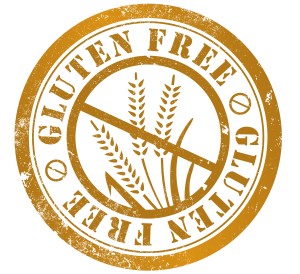 What’s with all the talk about moving from traditional diets to a gluten free diet? As you walk down the aisles of the supermarket these days you see more and more labels touting “Gluten Free”. If you go to any catered function you will see several items labeled gluten free. Every caterer knows about specialty meals, there’s nothing new about that, but the keen awareness put on gluten free products has risen significantly.
What’s with all the talk about moving from traditional diets to a gluten free diet? As you walk down the aisles of the supermarket these days you see more and more labels touting “Gluten Free”. If you go to any catered function you will see several items labeled gluten free. Every caterer knows about specialty meals, there’s nothing new about that, but the keen awareness put on gluten free products has risen significantly.
So why have gluten free diets gotten such a bad rap recently? Many people think its just another marketing trend. Remember when we were told – and sold – that eggs were bad for us? A nationwide campaign was launched that sent fear into the hearts of anyone wanting to eat eggs for breakfast. The marketing machine manipulated us as a nation into thinking the only safe part of the egg to eat on a regular basis was the egg’s whites. Products were introduced and sold like crazy, as the population bought into the concept hook, line and sinker. To this day I wonder who was behind that scam and for what monetary gain? Gluten is a different story. Of course the marketing machine has jumped on board, but this time at the request of the informed consumer.
You might wonder if gluten is so bad how on earth have we managed for the centuries we’ve been eating it? It’s been shown that we are not eating the same gluten our ancestors ate, and in fact today’s grains bear little resemblance to gluten we consumed just over 50 years ago. As a result of bio-engineering and crossing different plants to arrive at new varieties gluten has been given a entire makeover. These manipulations have increased the grains to contain up to 40 times the amount of gluten that they had just a few decades ago. Why? There are a couple of theories: This process increases yield and the increase in gluten within a food makes the product more appealing to the palette. The second reason substantiates that modern gluten-containing grains are more addictive.
Gluten sensitivity and Celiac Disease are not necessarily the same. Celiac Disease is a uncompromising reaction to gluten in any form. Consuming gluten for a Celiac is debilitating and eventually life threatening. Gluten sensitivity is not the same, yet can cause a lot of damage if left unattended. While many people are tolerant, but sensitive to gluten they may be suffering from the side effects without realizing that their intake of gluten is the culprit.
More evidence has been revealed that food products using gluten are the dietary causes of serious health issues facing our society today. Studies showing the consistent intake of gluten to be linked to a number of present day ailments. To name a few; inflammation, the root symptom of rheumatoid arthritis, Lupus, as well as digestive problems and cognitive disorders like dementia and Alzheimers, depression, and neurological problems like Parkinsons, ataxia, dystonia, a severe spasms throughout the body. These may seem extreme, but since the introduction of low fat and high carbohydrates containing gluten into the eating pyramid an increase in these maladies has gone up significantly.
There are many of studies on this topic and Dr. David Perlmutter, MD’s best seller Grain Brain would be an excellent reference to start learning more. Gluten free diets may not be for everyone, but for some they might just be the ticket to living a healthier and happier lifestyle.